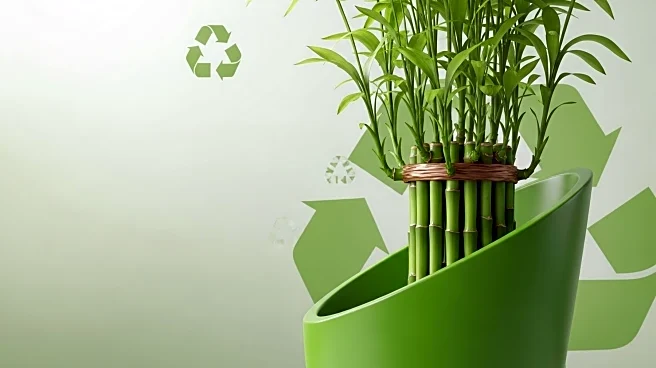What is the story about?
What's Happening?
Researchers at Shenyang University of Chemical Technology in China have developed a biodegradable plastic made from bamboo cellulose, which is as strong and durable as conventional plastics used in household appliances and car interiors. This new material is recyclable and biodegrades easily in soil, offering a sustainable alternative to traditional plastics. Despite its rigidity limiting its use in packaging, it targets a smaller set of engineering plastics, potentially alleviating sourcing concerns in that area. The bamboo plastic can be completely recycled while retaining 90% of its original strength, making it economically attractive despite not being as cheap as some common plastics.
Why It's Important?
The development of bamboo-based biodegradable plastic is significant as it addresses environmental concerns associated with traditional plastics. With over 400 million tonnes of plastics produced annually, bioplastics like this offer a renewable and sustainable alternative, potentially reducing reliance on oil-based plastics. This innovation could impact industries such as automotive and appliance manufacturing by providing a recyclable and biodegradable material option. The ability to recycle the bamboo plastic while maintaining its strength could drive its adoption, contributing to sustainability efforts and reducing plastic waste.
What's Next?
Further research and development could expand the applications of bamboo-based plastic, potentially increasing its use in various industries. As the material becomes more economically viable, it may see wider adoption, encouraging other companies to explore similar sustainable alternatives. The focus on improving the cost-effectiveness and versatility of bioplastics could lead to increased investment and innovation in the field, driving progress towards more sustainable manufacturing practices.
Beyond the Headlines
The use of bamboo, a fast-growing and renewable resource, highlights the potential for sustainable materials to replace traditional plastics. This development could influence cultural shifts towards environmentally friendly products and practices. As consumers become more aware of the environmental impact of plastics, demand for biodegradable options may rise, prompting companies to prioritize sustainability in their product offerings.















